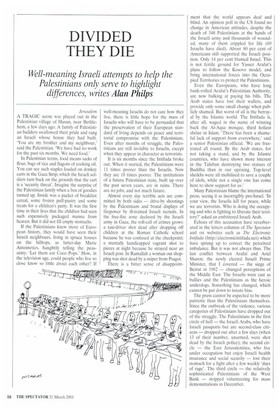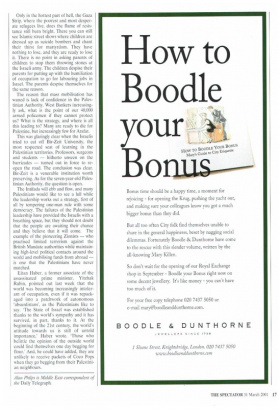DIVIDED THEY DIE
Well-meaning Israeli attempts to help the Palestinians only serve to highlight
differences, writes Alan Philps
Jerusalem A TRAGIC scene was played out in the Palestinian village of Husan, near Bethlehem, a few days ago. A family of Palestinian builders swallowed their pride and rang an Israeli whose house they had built. 'You are my brother and my neighbour,' said the Palestinian. We have had no work for the past six months. We need food.'
In Palestinian terms, food means sacks of flour, bags of rice and flagons of cooking oil. You can see such staples loaded on donkey carts in the Gaza Strip, which the Israeli soldiers turn back on the grounds that the cart is a 'security threat'. Imagine the surprise of the Palestinian family when a box of goodies turned up. Inside was a packet of breakfast cereal, some frozen puff-pastry and some treats for a children's party. It was the first time in their lives that the children had seen such expensively packaged manna from heaven. But it did not fill empty stomachs.
lithe Palestinians knew more of European history, they would have seen their Israeli neighbours, living in spruce houses on the hilltops, as latter-day Marie Antoinettes, haughtily telling the peasantry: 'Let them eat Coco Pops.' How, in the television age, could people who live so close know so little about each other? If well-meaning Israelis do not care how they live, there is little hope for the mass of Israelis who will have to be persuaded that the preservation of their European standard of living depends on peace and territorial compromise with the Palestinians. Even after months of struggle, the Palestinians are still invisible to Israelis, except when they appear in character as terrorists.
It is six months since the Intifada broke out. When it started, the Palestinians were 11 times poorer than the Israelis. Now they are 18 times poorer. The institutions of a future Palestinian state, built up over the past seven years, are in ruins. There are no jobs, and not much future.
Almost every day terrible acts are committed by both sides — drive-by shootings by the Palestinians and brutal displays of firepower by ill-trained Israeli recruits. In the free-fire zone declared by the Israeli army in Gaza, the roll-call of crimes grows: a taxi-driver shot dead after dropping off children at the Roman Catholic school because he was confused at the checkpoint; a mentally handicapped vagrant shot to pieces at night because he strayed near an Israeli post. In Ramallah a woman out shopping was shot dead by a sniper from Psagot.
There is a bitter sense of disappoint ment that the world appears deaf and blind. An opinion poll in the US found no change in American attitudes, despite the death of 348 Palestinians at the hands of the Israeli army and thousands of wounded, many of them crippled for life (69 Israelis have died). About 80 per cent of Americans still supported the Israeli position. Only 14 per cent blamed Israel. This is not fertile ground for Yasser Arafat's plans to follow the Kosovo model, and bring international forces into the Occupied Territories to protect the Palestinians.
Even the Europeans, who have long bank-rolled Arafat's Palestinian Authority, are now balking at paying his bills. The Arab states have lost their wallets, and provide only some small change when publicly shamed. But worst of all is the betrayal by the Islamic world. The Intifada is, after all, waged in the name of winning back the Al-Aqsa mosque, third holiest shrine in Islam. 'There has been a shameful lack of support from everywhere.' said a senior Palestinian official. 'We are frustrated all round. By the Arab states, for not taking a stand, and by the Islamic countries, who have shown more interest in the Taleban destroying two statues of Buddha than in our uprising. Top-level sheikhs were all mobilised to save a couple of idols, while not a single one has come here to show support for us.'
Many Palestinians blame the international press, seeing it as incorrigibly pro-Israel. 'In your view, the Israelis kill for peace, while we are terrorists, Who is doing the occupying and who is fighting to liberate their territory?' asked an embittered Israeli Arab.
Echoes of this accusation have reverberated in the letters columns of The Spectator and on websites such as The Electronic Intifada (http://electronicintifada.net) which have sprung up to correct the perceived imbalance. But it was not always thus. The last conflict between Arafat and Ariel Sharon, the newly elected Israeli Prime Minister, that I covered — the siege of Beirut in 1982 — changed perceptions of the Middle East. The Israelis were cast as bullies and the Palestinians as the heroic underdogs. Something has changed, which cannot be put down to innate bias.
The press cannot be expected to be more patriotic than the Palestinians themselves. Since the outbreak of the violence, various categories of Palestinians have dropped out of the struggle. The Palestinians in the first circle of hell — the Israeli Arabs, who have Israeli passports but are second-class citizens — dropped out after a few days (when 13 of their number, unarmed, were shot dead by the Israeli police); the second circle — the East Jerusalemites, who live under occupation but enjoy Israeli health insurance and social security — lost their stomach for a fight after a few weekly 'days of rage'. The third circle — the relatively sophisticated Palestinians of the West Bank — stopped volunteering for mass demonstrations in December. Only in the hottest part of hell, the Gaza Strip, where the poorest and most desperate refugees live, does the flame of resistance still burn bright. There you can still see Islamic street shows where children are dressed up as suicide bombers and chant their thirst for martyrdom. They have nothing to lose, and they are ready to lose it. There is no point in asking parents of children to stop them throwing stones at the Israeli army. The children despise their parents for putting up with the humiliation of occupation to go for labouring jobs in Israel. The parents despise themselves for the same reason.
The reason that mass mobilisation has waned is lack of confidence in the Palestinian Authority. West Bankers increasingly ask, what is the point of our 40,000 armed policemen if they cannot protect us? What is the strategy, and where is all this leading to? Many are ready to die for Palestine, but increasingly few for Arafat.
This was glaringly clear when the Israelis tried to cut off Bir-Zeit University, the most respected seat of learning in the Palestinian territories. Professors, surgeons and students — hitherto unseen on the barricades — turned out in force to reopen the road. The conclusion was clear. Bir-Zeit is a venerable institution worth preserving. As for the seven-year-old Palestinian Authority, the question is open.
The Intifada will ebb and flow, and many Palestinians would like to see a lull while the leadership works out a strategy, first of all by tempering one-man rule with some democracy. The failures of the Palestinian leadership have provided the Israelis with a breathing space, but they should not doubt that the people are awaiting their chance and they believe that it will come. The example of the pioneering Zionists — who practised limited terrorism against the British Mandate authorities while maintaining high-level political contacts around the world and mobilising funds from abroad — is one that the Palestinians have never matched.
Eitan Haber, a former associate of the assassinated prime minister, Yitzhak Rabin, pointed out last week that the world was becoming increasingly intolerant of occupation, even if it was repackaged into a patchwork of autonomous `absurdistans', as the Palestinians like to say. 'The State of Israel was established thanks to the world's sympathy and it has survived, in part, thanks to it. At the beginning of the 21st century, the world's attitude towards us is still of untold importance,' Haber wrote. 'Those who belittle the opinion of the outside world could find themselves one day begging for flour.' And, he could have added, they are unlikely to receive packets of Coco Pops when they go begging from their Palestinian neighbours.
Alan Philps is Middle East correspondent of the Daily Telegraph.



























































































 Previous page
Previous page